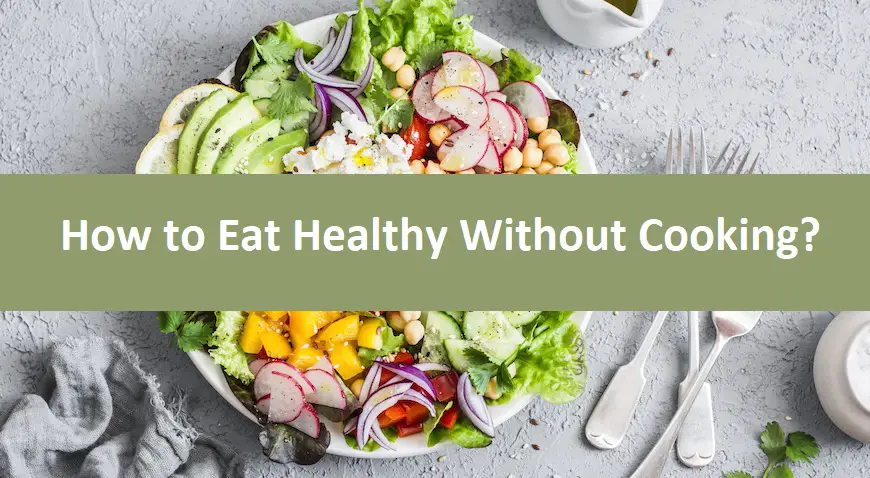Are you looking to eat healthier but don’t have the time or energy to cook? Good news – you can still make healthy choices without even turning on the stove.
In this blog post, we’ll share some easy no-cook meal and snack ideas and tips for healthy eating without cooking. So, whether you’re a busy professional, a student, or just looking for some easy and healthy options, this blog post has got you covered. Let’s get started!
How to Eat Healthy Without Cooking
Eating healthy can be a challenge, especially when you don’t have the time or the energy to cook. Fortunately, there are many ways to eat healthily without cooking. By following these tips, you can improve your diet and enjoy a wide variety of nutritious foods.
1. Stock up on healthy ingredients.
One of the keys to eating healthy without cooking is to have a well-stocked pantry and fridge. This way, you can quickly and easily put together a healthy meal or snack without having to cook. Some healthy ingredients to keep on hand include:
- Fresh fruits and vegetables
- Nuts and seeds
- Whole grain bread and crackers
- Canned tuna or salmon
- Hummus and other dips
- Yogurt and kefir
- Cheese and other dairy products
- Hard-boiled eggs
2. Choose pre-made healthy options.
There are many pre-made options available that are healthy and don’t require cooking. Some examples include:
- Pre-cut fruits and vegetables
- Pre-packaged salads
- Pre-cooked hard-boiled eggs
- Pre-cooked quinoa or rice
- Canned soups and stews (make sure to choose low-sodium options)
- Freshly made smoothies or juices
3. Make use of kitchen gadgets.
There are many kitchen gadgets that can help you prepare healthy meals without cooking. Some useful gadgets include:
- Blender or food processor for smoothies and dips
- Microwave for heating up pre-cooked foods
- Salad spinner for washing and drying greens
- Vegetable peeler for preparing raw veggies
- Mandoline for slicing vegetables thinly
- Spiralizer for making vegetable noodles
Healthy No-Cook Meal Ideas
Now that you have some tips for eating healthy without cooking let’s look at some meal ideas that don’t require any cooking.
- Greek yogurt and fruit parfait: Layer Greek yogurt with your favorite fruit, such as berries or sliced peaches, and top with nuts or granola.
- Veggie wrap: Use a large lettuce leaf or collard green as a wrap and fill it with hummus, sliced veggies, and avocado.
- Tuna or salmon salad: Mix canned tuna or salmon with chopped veggies, such as celery and onion, and a healthy dressing, such as olive oil and lemon juice. Serve on whole grain bread or with crackers.
- Caprese salad: Layer sliced tomatoes and fresh mozzarella on a plate and drizzle with olive oil and balsamic vinegar. Top with fresh basil.
- Overnight oats: Mix rolled oats with yogurt, milk, and fruit and let sit in the fridge overnight. In the morning, top with nuts or seeds for added crunch.
Healthy No-Cook Snack Ideas
Snacking can be a challenge when you’re trying to eat healthily without cooking, but there are many options available.
- Apple slices with almond butter: Slice up an apple and dip it in almond butter for a healthy and satisfying snack.
- Veggie sticks with dip: Cut up veggies, such as carrots, cucumbers, and bell peppers, and serve with hummus or another healthy dip.
- Trail mix: Mix together nuts, seeds, and dried fruit for a portable and healthy snack.
- Hard-boiled egg: Hard-boil some eggs ahead of time and keep them in the fridge for a quick and easy protein-packed snack.
- Yogurt and fruit: Mix together plain yogurt and your favorite fruit for a creamy and sweet snack.
Tips for Eating Healthy Without Cooking
Tip 1: Read food labels.
When choosing pre-made or packaged foods, make sure to read the food labels carefully. Look for options that are low in added sugars, sodium, and saturated fat and high in fiber, protein, vitamins, and minerals.
Tip 2: Plan ahead.
To ensure you have healthy options available when you need them, plan ahead. Make a grocery list of healthy ingredients and pre-made options you want to keep on hand, and prep snacks and meals ahead of time when possible.
Tip 3: Be mindful of portion sizes.
Even healthy foods can lead to unwanted results if eaten in excess. Be mindful of portion sizes and stick to recommended serving sizes.
Tip 4: Stay hydrated.
Finally, drinking enough water is important for overall health and can also help you feel full and avoid overeating. So, it’s always a good idea to keep a water bottle with you and aim to drink at least eight glasses of water per day.
Maintaining a Balanced Approach to Healthy Eating
Eating healthy is an important part of taking care of your body, but it’s also important to maintain a balanced approach to healthy eating. This means that you don’t have to completely eliminate certain foods or food groups from your diet, but rather aim for moderation and balance.
One way to maintain a balanced approach to healthy eating is by following the 80/20 rule. This means that 80% of your diet is made up of nutrient-dense, whole foods like fruits, vegetables, lean protein, whole grains, and healthy fats. The remaining 20% can be more flexible and include treats, indulgences, or less healthy options.
Another way to maintain a balanced approach to healthy eating is by listening to your body’s hunger and fullness cues. Pay attention to when you feel hungry and when you feel satisfied, and try to stop eating before you feel overly full.
It’s also important to avoid labeling foods as “good” or “bad.” All foods can fit into a healthy diet in moderation, and labeling certain foods as “off-limits” can create an unhealthy relationship with food.
Finally, remember that healthy eating is not an all-or-nothing approach. It’s okay to have days where you indulge in less healthy options or enjoy a meal out with friends and family. The key is to maintain a balanced approach over the long term and not get caught up in perfectionism.
By maintaining a balanced approach to healthy eating, you can improve your health and well-being without feeling deprived or restricted.
Conclusion
In short, eating healthy without cooking is not only possible but also enjoyable with the right mindset and approach. By making small changes and incorporating healthy habits into your daily routine, you can achieve a healthier lifestyle without feeling overwhelmed or restricted. So, don’t be afraid to try out some of the tips and ideas provided in this article and discover the joy of healthy eating!

Morgan Elfman is a compassionate writer, dedicated caregiver, and passionate advocate for senior well-being. Born and raised with a deep sense of empathy and a natural inclination towards service, Morgan has devoted her life to making a positive impact on the lives of seniors.
As a writer for www.choiceseniorlife.com, Morgan utilizes his skills to create insightful and informative content that addresses the unique needs and challenges faced by seniors and their families. Her articles not only provide valuable information on health, lifestyle, and care options but also strive to inspire and empower seniors to lead fulfilling lives.
